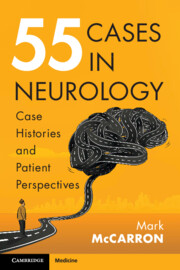Book contents
- 55 Cases in Neurology
- 55 Cases in Neurology
- Copyright page
- Contents
- Preface
- Acknowledgements
- Section 1 Visual Disturbance
- Section 2 Headache and Pain
- Section 3 Weakness
- Section 4 Behavioural and Language Changes
- Section 5 Confusion
- Section 6 Movement Disturbances
- Case 38 Involuntary Arm Movement
- Case 39 Salt Control
- Case 40 A Young Man with More Than Dizziness
- Case 41 Late Familial Falling
- Case 42 Non-familial Falling
- Case 43 Shaking Leg
- Case 44 A Viral Opportunity
- Case 45 More Searching for Causes of Progressive Unsteadiness
- Section 7 Acute Onset of Neurological Symptoms
- Index
- Plate Section (PDF Only)
- References
Case 45 - More Searching for Causes of Progressive Unsteadiness
from Section 6 - Movement Disturbances
Published online by Cambridge University Press: 27 July 2023
- 55 Cases in Neurology
- 55 Cases in Neurology
- Copyright page
- Contents
- Preface
- Acknowledgements
- Section 1 Visual Disturbance
- Section 2 Headache and Pain
- Section 3 Weakness
- Section 4 Behavioural and Language Changes
- Section 5 Confusion
- Section 6 Movement Disturbances
- Case 38 Involuntary Arm Movement
- Case 39 Salt Control
- Case 40 A Young Man with More Than Dizziness
- Case 41 Late Familial Falling
- Case 42 Non-familial Falling
- Case 43 Shaking Leg
- Case 44 A Viral Opportunity
- Case 45 More Searching for Causes of Progressive Unsteadiness
- Section 7 Acute Onset of Neurological Symptoms
- Index
- Plate Section (PDF Only)
- References
Summary
A 40-year-old man was referred for neurological assessment. He had had a five-year history of progressive slurred speech, difficulty initiating swallowing of both liquids and solids, choking episodes and poor balance.
- Type
- Chapter
- Information
- 55 Cases in NeurologyCase Histories and Patient Perspectives, pp. 307 - 314Publisher: Cambridge University PressPrint publication year: 2023



